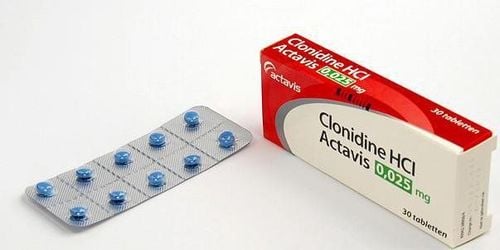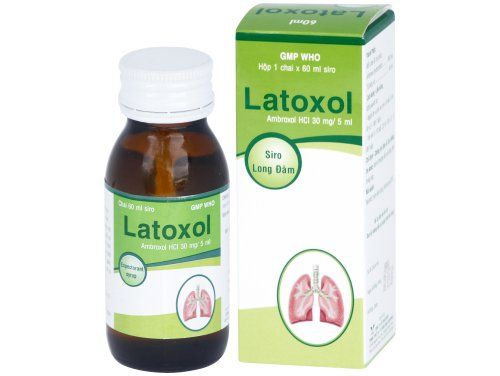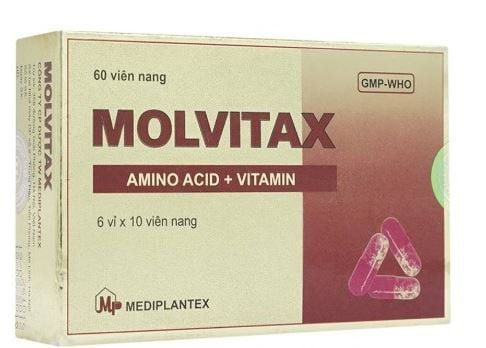This is an automatically translated article.
Hasanvit drug belongs to the list of vitamins and minerals, with the main ingredients being vitamins of group B and vitamin C, made in the form of effervescent tablets, packed in a tube of 20 tablets. To learn more information about the drug Hasanvit, follow the article below.
1. What is Hasanvit?
Hasanvit medicine is prepared in the form of effervescent tablets, with the main ingredients including: vitamin C, vitamin B1, vitamin B2, vitamin B5, vitamin B6, vitamin E, vitamin H, packed in 20 tablets/tube. Hasanvit is a combination of Vitamin C and B vitamins. In particular, Vitamin C helps increase resistance, supports immunity, supports the processes of protein, glucid and lipid metabolism in the body, helps stimulate appetite, increases health recovery. Vitamins B1, B6 have many roles in the functioning of the nervous system. Vitamins B2, B5, PP are essential for normal growth of hair, skin, nails, and mucous membranes. Vitamin B9 is involved in the formation of red blood cells in the blood. The combination of vitamins above has an anti-inflammatory effect, helping lesions on the skin, mucous membranes, and soft tissues heal quickly.
2. What is the effect of Hasanvit?
Hasanvit medicine is used to provide necessary vitamins for the body, improve health, improve immunity, to prevent or treat:
Disorders related to food absorption disorders, Unbalanced diet, lack of nutrients. Cases of disorders related to people with mental and physical stress, smokers, children in the developing period, pregnant women and breastfeeding mothers. Disorders involving patients after surgery or in the recovery period after chronic illnesses.
3. Dosage of Hasanvit
Specific dosage must depend on each patient's condition and disease condition. You should follow your doctor's advice to take the most appropriate dose. The following dosage you can refer to.
Adults and children over 12 years old take 1-3 tablets / day.
4. How to use the drug Hasanvit
Dissolve one Hasanvit tablet in 200ml of filtered water, after the drug is completely dissolved, stir well and then drink the medicine. Reports indicate that the absorption of vitamins is not affected by food. The best time to take the medicine is 1 hour after breakfast or lunch. The drug should not be taken in the evening because it may increase the risk of kidney stone formation. Hasanvit medicine should be stored at a temperature below 30 degrees Celsius, in a cool, dry place, away from moisture and away from direct sunlight.
5. Contraindications of Hasanvit
Hasanvit drug is not used for cases:
Hypersensitivity to any ingredient in the drug. Severe liver disease, peptic ulcer in advanced stage, arterial bleeding, severe hypotension. Have a deficiency of the enzyme Glucose-6-Phosphat Dehydrogenase , because it can cause hemolytic anemia . People with a history of kidney stones, Oxalat metabolism disorders, increased Oxalaturia because the drug increases the risk of kidney stones.
6. Hasanvit drug interactions
According to reports, there have been no harmful interactions with users. However, for your own safety, you should tell your doctor about all the medicines you are taking and all the diseases you have.
Some interactions of Hasanvit drugs:
Vitamin B1: May increase the therapeutic effect of neuromuscular blockers. Vitamin B2: reduced absorption if taken with alcohol or probenecid. Vitamin PP: increased risk of rhabdomyolysis if co-administered with HGM CoA reductase inhibitors, may lower blood pressure if used with alpha-adrenergic blockers, may increase toxicity if used concomitantly Hepatotoxicity, increased plasma concentrations of carbamazepine when co-administered. Vitamin B6: Increased need for vitamin B6 if taken with oral contraceptives. Vitamin B8: biotin sulfon, avidin, desthiobiotin, some imidazolidone carboxylic acids antagonize the effects of vitamin B8. Vitamin B9: reduced absorption if taken with Sulfasalazine. Decreased metabolism if taken with oral contraceptives. May decrease blood levels of anticonvulsants. Vitamin C: reduces aspirin excretion and increases ascorbic acid excretion if taken concomitantly with aspirin. May affect blood and urine creatinine and glucose levels. Vitamin C can increase the effect of aluminum hydroxide, reduce the absorption of selenium, reduce the effect of amphetamine. Vitamin E: increases blood clotting time because it has an antagonistic effect with vitamin K. When used with cholestyramine, colestipol, orlistat, vitamin E is malabsorption.
7. Side effects of the drug Hasanvit
Vitamin B6: headache, convulsions, lethargy, drowsiness, decreased folic acid, nausea, vomiting, AST increased. When used in doses above 200 mg/day and lasts for more than 2 months, it may cause peripheral neuritis. This condition is reversible upon discontinuation of the drug, but may leave sequelae. Allergy. Vitamin C: increases urinary oxalate. Vitamin B2: When taken in high doses, the urine will turn pale yellow, causing errors in some urine tests. Vitamin PP: vomiting, loss of appetite, stomach ulcers, pain when hungry, flatulence, diarrhea. Dry skin, hyperpigmentation, jaundice, rash. Liver failure, impaired glucose tolerance. Increased uric acid aggravates gout. Hyperglycemia, headache, dry eyes, blurred vision, eyelid swelling, dizziness, tachycardia, fainting. Vitamin C: causes hemolytic anemia, heart failure, flushing, fainting, dizziness, headache, fatigue. Nausea, vomiting, belching, abdominal pain, bloating, diarrhea, abdominal muscle spasms if taking 21g/day. Side pain. Vitamin E: Side effects may occur with high doses and prolonged use. Headache. blurred vision, nausea, abdominal pain, diarrhea, digestive disorders, enteritis. Breast pain, increased cholesterol, increased blood triglycerides, decreased thyroxin, decreased blood triiodothyronin. Increased serum creatinine kinase, increased estrogen, increased urinary androgen. Dermatitis, rash, thrombophlebitis. Vitamin B1 : Very rare side effects and usually in an allergic pattern. Rare side effects: profuse sweating, shock, dyspnoea, hypertension, pruritus, skin rash, urticaria, irritation at the injection site. Vitamin PP: anxiety, panic attacks, abnormal liver function, urinary glucose, abnormal prothrombin time, hypoalbuminemia, anaphylaxis. Muscle pain, insomnia, low blood pressure, rhinitis. Vitamin B5: Reports indicate generally no toxicity. Vitamin B8: No side effects have been reported. Vitamin B9: rash, urticaria, digestive disorders. When experiencing any undesirable effects of the drug, it is necessary to stop using and immediately notify the doctor, go to the nearest medical facility if possible.
8. Notes when using Hasanvit
With severe vitamin deficiency, not recommended Each Hasanvit tablet contains 287.5mg Na, so little or no sodium salt should be used. Liver function and blood glucose should be checked before drug therapy. Use caution when administering high doses to patients with a history of peptic ulcer disease, acute coronary artery disease, gout, hepatobiliary disease, kidney disease, and diabetes. Drugs containing vitamin B6, using doses above 200mg/day, lasting for more than 30 days, may cause pyridoxine dependence, withdrawal syndrome. Folic acid (B9) should be used with caution as it may relieve symptoms of vitamin B12 deficiency anemia but lead to nerve damage. Using high doses of Vitamin C for a long time can lead to drug resistance, when reducing the dose, it will lead to Vitamin C deficiency. Use with caution in people with a history of kidney stones because vitamin C increases oxalateuria, forming oxalate stones in the blood. kidneys, acidification of urine, precipitation of urate, cystine, oxalate, enamel erosion. Use of high doses of vitamin C in pregnant women can lead to scurvy in the baby. Taking high doses of vitamin C in people with glucose-6-phosphate dehydrogenase deficiency can cause hemolysis. Vitamin C can falsify the results of a urine glucose test. In people with tissue iron deficiency or with high iron stores, long-term high doses of vitamin C can cause cardiomyopathy. The drug contains Vitamin E, which may cause bleeding in patients with vitamin K deficiency or taking anticoagulants. The drug does not affect the ability to drive and use machines. For women during pregnancy and lactation, use as above dose does not cause harm. But you should follow your doctor's instructions. Hasanvit medicine is used to supplement vitamins necessary for the body, to enhance immunity and improve the body's resistance. Hasanvit can be used by everyone, but to be safe, you should consult your doctor or pharmacist. The article provided information about what drug Hasanvit is, dosage and note when using. To ensure safety for your health and maximize the effectiveness of your treatment, you need to take Hasanvit exactly as directed by your doctor.
tags:
Pharmacy
Safe drug use
Hasanvit medicine













